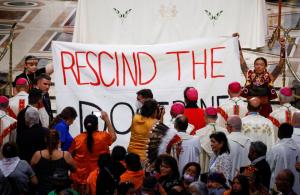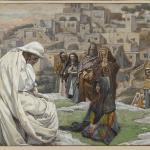
On Thursday, March 30, the Church formally rejected the Doctrine of Discovery.
I learned about the Doctrine of Discovery from a folksinger in Montana. Jack Gladstone, a member of the Blackfeet tribe is Montana’s official troubadour and storyteller. In regular performances in Glacier National Park he would often describe and censure this hateful doctrine for his mostly white audiences. I have written about Jack Gladstone before.
Much earlier, in Catholic grade school, I learned about the “demarcation line” that Pope Alexander VI established in 1493. His Papal Bull “Inter Caetera” separated Spanish and Portuguese land claims in the New Worlds. Essentially it gave colonization rights in Africa to Portugal and in most of the Americas to Spain. These allotments were to change through subsequent history obviously. What didn’t change was the appearance of blessing on European hegemony from a series of Papal Bulls at the dawn of the age of colonization.
In the 1950’s the Church was not ready to teach Catholic school children about the Church’s responsibility for the results that accrued to indigenous peoples. I learned little or, in some areas, nothing about:
- Enslavement of and even attempts to exterminate indigenous peoples,
- Systematic appropriation of the wealth of indigenous lands,
- Loss of indigenous languages, cultures, and spiritualities
- Separation of children from their families and their cultures in punitive, often “Christian,” boarding schools,
- Weakened family structures and cultural norms and invasion by Western consumerism and drug culture,
- Wide-spread discrimination against indigenous peoples.
Some Legal history of the Doctrine of Discovery
The bull [“inter Caetera”] stated that any land not inhabited by Christians was available to be “discovered,” claimed, and exploited by Christian rulers…. [It stated further] that barbarous nations be overthrown and brought to the faith itself.” (Gilder Lehrman Institute of American History article, “The Doctrine of Discovery, 1493”)
In other words, if people are not Christian they have no right to land or self-government. This concept, the institute’s article says, “became the basis of all European claims in the Americas as well as the foundation for the United States’ western expansion.”
In 1823 the US Supreme Court coined the phrase “Doctrine of Discovery.” It held that “the principle of discovery gave European nations an absolute right to New World lands.” The above article comments, “In essence, American Indians had only a right of occupancy, which could be abolished.”
In 2005 a unanimous Supreme Court denied an Oneida tribe’s attempt to use an ancient right to avoid paying taxes on lost but newly acquired tribal land. Justice Ruth Bader Ginsburg referenced the “Doctrine of Discovery” in writing this decision. (American Indian Law Alliance)
Change a long time coming
In the 1990’s, when I spent many summer nights listening to Jack Gladstone, the bull “Inter Caetera” was becoming newsworthy. Catholics were petitioning Pope John Paul II to revoke the Doctrine of Discovery. They urged him to “recognize the human rights of indigenous ‘non-Christian peoples.’” (From the Gilder Lehrman Institute article) The second part of that request had already made its way into Church documents going back as far as 1537. In that year Pope Paul III wrote:
We define and declare … people who may be discovered by Christians are by no means to be deprived of their liberty or the possession of their property…. {N]or should they be in any way enslaved.” (Catholic News Agency)
Still, until last Thursday the Church had not disavowed the offending papal bulls.
Eight months earlier, Pope Francis had spoken with First Nations people, Métis, and Inuit during a visit to Canada. He heard what Canadian Indigenous had to say about the Doctrine of Discovery. Vatican News reported:
The words sorry, shame, pain and indignation resounded strongly in Pope Francis’s first public speech of his penitential pilgrimage…..
The pope implored God’s forgiveness and longed for healing and reconciliation. But, he said, begging pardon is only a first step in creating “a culture able to prevent such situations from happening.” A further step took place in the Vatican last Thursday.
Vatican rejects the Doctrine of Discovery
A Vatican statement by the dicasteries for Culture and Education and for Promoting Integral Human Development repudiated
… those concepts that fail to recognize the inherent human rights of indigenous peoples, including what has become known as the legal and political ‘doctrine of discovery.’
Rreferring to decrees of the 15th century, the statement “acknowledges that these papal bulls did not adequately reflect the equal dignity and rights of indigenous peoples.”
That was an understatement. A gilder Lehrman Institute of American History article, “The Doctrine of Discovery, 1493,” specifies what the bull “Inter Caetera” did do. It stated that
… any land not inhabited by Christians was available to be “discovered,” claimed, and exploited by Christian rulers…. [It stated further] that barbarous nations be overthrown and brought to the faith itself.”
In other words, if people are not Christian they have no right to land or self-government. This doctrine “became the basis of all European [land] claims [and] the foundation for the United States’ western expansion.”
Colonial powers justified their “immoral acts against indigenous peoples” by citing Church documents. The Vatican statement acknowledges that these actions continued “at times without opposition from ecclesiastical authorities.”
Looking forward
Thursday’s Vatican statement commits the Church to accompanying indigenous peoples and fostering efforts to promote reconciliation and healing. Dialogue with indigenous peoples is helping the Church understand “their values, cultures, as well as past and present sufferings.” That suffering is “a powerful summons to abandon the colonizing mentality and to walk with [indigenous peoples] side by side.”
History demands that the Church acknowledge her members “weakness and failings … in every generation,” the statement says.












